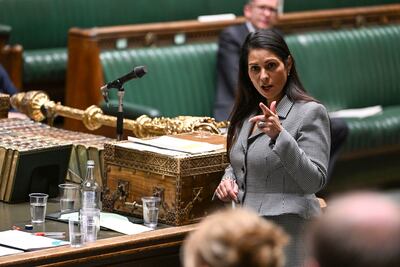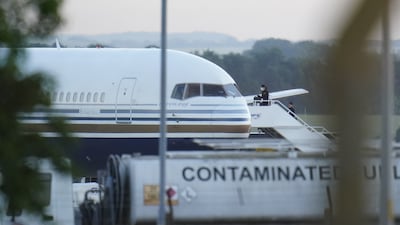Asylum-seekers who were mere moments away from being flown to Rwanda described feeling terrified as they were manhandled, restrained and intimidated by officials who forced them to board the first deportation aircraft hours before a European court decision grounded the plane.
One of the men, a 25-year-old Kurd from Iran, told The Independent newspaper that he was forced to the floor of the plane by a knee to his head before being strapped into a restraining harness “like a dog”.
The man, Zoran, had escaped political persecution in his native country for Britain less than two months earlier. Describing the physical and mental ordeal he went through in the last hours before the European Court of Human Rights’ injunction stopped the flight on Tuesday, he said it was “nothing I have ever gone through before” and that “it felt like I was going to die”.
Zoran was one of seven men who were scheduled to be on the first UK-Rwanda flight from Boscombe Down, near Salisbury, on a 200-seat 767 Boeing aircraft at a cost to the British taxpayer of up to £500,000 ($598,000).
Ministers had originally planned for as many as 130 people to be on board the plane, but by Tuesday it had shrunk to seven with a series of appeals failing in UK courts with just hours remaining.
Mohammed, another asylum-seeker from Iran, was escorted on to the Tuesday flight from the detention centre near Heathrow airport where he was being held.
He said the last phone call he made from his detention room to his wife, who is still in Iran with his children, was “very painful” and felt like “the last time”.
Mohammed described being surrounded by five officers in a car as he was driven to the runway in a 90-minute journey that felt like he “was going to be executed”.
“I was really puzzled. I was thinking, ‘What crime have I committed to be treated like this?’ It was very humiliating,” he said.
Fainting from fear
Confusion and dread overtook the men who found themselves suddenly on the brink of being taken thousands of kilometres away to another country and continent to the one they had sought safety in.
An Iraqi Kurd said he fainted from fear when the time came to collect him from his detention cell, forcing the officers to take him out on a stretcher, in handcuffs.
The father of four said he “would rather choose death instead of being taken to Rwanda” and begged the UK government to let him free.
Another Kurdish man from Iraq, Rasool, said he felt suicidal when the officers came to take him to the plane, saying that he could not “compare it to death, death is better”.
He said the way that the officers physically forced him out of his cell and on to the plane “reminded me of the traffickers”.
Surrounded by Home Office officials, all the men were on the plane, engines whirring, when their prayers were finally answered.
Last-minute reprieve
Rasool was the first to hear from his lawyer that a last-minute injunction meant he would no longer be taken to Rwanda that evening. He was at the airport but not yet on the aircraft when he got the phone call, but it took hours before the news trickled down to the officers surrounded him.
Mohammed was already on the plane with the other deportees, “praying for them to be strong and to be calm”, when the momentous news of their reprieve arrived.
“Some of the security guards and others were actually happy. They were hugging us. They were congratulating us,” Mohammed said. “It was clear they were just trying to obey orders. It wasn’t something that even they were comfortable with.”
As he stepped off the plane Mohammed described feeling “happy and relieved” but nevertheless “still unsure of what the future holds”.
Temporary relief as future remains unclear
Indeed, the joy and relief at having dodged an unwanted exile to Rwanda is tenuous as UK ministers who back the controversial deportation policy stepped up their commitment to see it through, despite mounting criticism and the ECHR’s ruling.

After Home Secretary Priti Patel’s first flagship UK-Rwanda deportation flight was aborted, she said the government would “not be deterred from doing the right thing and delivering our plans to control our nation’s borders”.
“Preparation for the next flight begins now,” she said.
Meanwhile, the European Court ruling on Tuesday adds impetus to plans from UK Secretary of State for Justice Dominic Raab to replace the Human Rights Act, which enshrines the ECHR in domestic law, with a new Bill of Rights.
Amid an continuing legal tussle over the government’s Rwanda plans, an increasingly hostile policy towards migrants has extended towards lawyers, who prime minister Boris Johnson suggested were “abetting the work of criminal gangs” when representing migrants.
The comments prompted the Bar Council and Law Society of England and Wales to issue a joint statement condemning the “misleading and dangerous” comments from Mr Johnson, and highlighting the UK’s confrontational tug-of-war over human rights and migrant policy.
As for the future of the men who endured the rollercoaster journey through one of the UK’s most hard-line and divisive immigration policies, the fear they experienced throughout it is indelible and, perhaps to the benefit of Home Office’s aims, has altered their view on Britain as a safe haven.
“I had finally felt safe when I arrived in the UK,” Rasool said. “I knew it was a democratic country and now I know that is a lie.”


